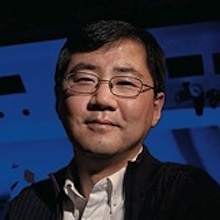Associate Member, Broad Institute
Nanometer-sized materials represent a natural size limit of the miniaturization trend of current technology, and they exhibit physical and chemical properties significantly different from their bulk counterparts. The research interest of Hongkun Park lies in developing detailed physical and chemical understanding of these nanostructures and applying this knowledge to technological applications. Research efforts toward these goals center on two areas: nano-bio interfacing and quantum optoplasmonics.
The goal of his nano-bio interfacing effort is to develop new nanoscale tools for interrogating living cells and cell networks. He developed a vertical nanowire platform that can deliver diverse biological effectors into virtually any cell type, and is applying the platform to interrogate intracellular circuits that dictate the functions of primary immune cells. Using the same vertical nanowires, he developed a highly scalable platform for recording and stimulating real-time dynamics of complex neuronal ensembles and is using this tool to study the inner workings of the brain. More recently, he developed a pipeline for single-cell transcriptomics that is applicable to a broad range of cell types, using it to study the cell-to-cell variability of immune, cancer, and neuron cells.
The goal of his quantum optoplasmonics effort is to develop solid-state photonic, optoelectronic, and plasmonic devices that work down to the single photon level. Examples of these devices include single-photon transistors, electrically driven surface plasmon lasers, and on-chip plasmon sources and detectors. These devices, whose operation is dependent upon quantum mechanical principles, may enable all-optical computing and provide the basis for solid-state quantum information processing.

